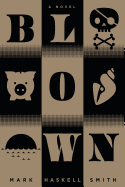
| Publisher: | Black Cat/Grove | |
| Genre: | Literary, Fiction | |
| ISBN: | 9780802128140 | |
| Pub Date: | June 2018 | |
| Price: | $16 |
| Fiction |
by Mark Haskell Smith
Los Angeles comic crime novelist Mark Haskell Smith (Moist, Salty, Raw) sends up Wall Street in the comic thriller Blown. Bryan LeBlanc works the esoteric foreign currency trading desk among "the US Marines of capitalism... the few, the proud, the completely full of themselves... surfing the algorithm, riding the markets in new and ever more complex machinations, shooting the tube to wrest lucre from the system." Fed up and seeing a loophole that will allow him to embezzle $17 million while sending an "up yours" message to the fat cats sitting at the top of his firm, LeBlanc engineers a complex scheme to skim clients' margin accounts for a bundle of foreign currency stashed in the Cayman Islands. The chase is on.
As LeBlanc goes island-hopping, Smith flexes his character muscles and funny bone with a colorful coterie of company bloodhounds unleashed to track him down. There's his immediate boss, Korean American Seo-yun Kim, who's an algorithmic automaton chafing under an impending conventional marriage and getting a little frisky sexually. The firm's chief security investigator, Neal Nathanson, is recovering from a boyfriend break-up and looking to trucker porn for comfort. After a fatal run-in with his silent partner in George Town, LeBlanc finds yet another pursuer closing in--a relentless, randy 4'7" ex-cop PI from Curaçao. Like one of Tim Dorsey's Serge and Coleman road trips, LeBlanc's romp through the Caribbean is full of conniving and missteps. Cleverly plotted, raunchy and very funny, Blown is a crime novel with an edge--an unlikely mashup of Gordon Gekko and Jimmy Buffet. --Bruce Jacobs, founding partner, Watermark Books & Cafe, Wichita, Kan.

| Publisher: | Flatiron Books | |
| Genre: | Fiction, LGBT, Gay | |
| ISBN: | 9781250147448 | |
| Pub Date: | May 2018 | |
| Price: | $21.99 |
| Fiction |
by North Morgan
Into?, the third novel by North Morgan (Highlights of My Last Regret), follows 32-year-old Konrad Platt, an aimless, neurotic and narcissistic gym-obsessed gay man caught up in the revolving door of unfulfilling hookups and even worse relationships.
Platt feels similar to Bret Easton Ellis's privileged, passive and disaffected protagonists in Less Than Zero and American Psycho. After a messy breakup with his boyfriend, he moves from London to California. A financial adviser at his wealthy father's firm, he works from home; his job requires very little time and is very lucrative. Most of his days are spent trolling his ex's Facebook posts, going to the gym to exercise and cruise men, and searching gay hook-up apps for men who fall into his strict physical and mental parameters (i.e., straight-acting, closeted "bros" with little interest beyond physical encounters).
Handsome, buff and financially well-off, Platt is still a victim of his own insecurities and neuroses. When he has bad sex with a hook-up, he still texts the guy afterward seeking validation. He is self-aware enough to realize how empty his life is, but diverts himself with sex, drugs and social media whenever he's tempted to make changes.
Into? (previously published in the U.K. in 2016 with the better title Love Notes to Men Who Don't Read) is a fascinating and compelling novel of internalized homophobia among gay men and how social apps have increased the availability of sexual encounters while keeping people more emotionally detached. Readers won't get bored following Platt's repetitious encounters, though, thanks to Morgan's lacerating observations and cool, dry wit. --Kevin Howell, independent reviewer and marketing consultant
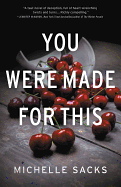
| Publisher: | Little, Brown | |
| Genre: | Psychological, Women, Suspense, Thrillers, Fiction | |
| ISBN: | 9780316475402 | |
| Pub Date: | June 2018 | |
| Price: | $27 |
| Starred | Mystery & Thriller |
by Michelle Sacks
Michelle Sacks's debut novel, You Were Made for This, follows a seemingly perfect couple down a dark rabbit hole of sexual obsession and domestic isolation. When Sam inherits a picturesque cottage in Sweden, it seems to be the perfect opportunity for him, his wife, Merry, and their newborn, Conor, to make a fresh start. But beneath their beautiful and tranquil existence, they both hide dark secrets from their past, and Merry's domestic exterior is cracking under the pressure of their marriage and motherhood. Frank, Merry's seductive, charismatic childhood friend, comes to visit, and all of their lives unravel in the face of past horrors and new tragedies.
As in her short story collection, Stone Baby, Sacks proves herself to be an expert of both language and atmosphere. By turns mesmerizing and horrifying, You Were Made for This confronts the dark truths behind motherhood, marriage and female friendship with disquieting lyricism. Her intricately woven perspectives and carefully drawn fairytale setting create a world that soon feels more convincing, albeit more disturbing, than our own. The voices of her consistently rotten but unmistakably human characters seduce the reader into a nightmarish dreamscape that is terrifying and thought-provoking for its uncanny familiarity.
You Were Made for This plumbs the thematic depths of the popular domestic thriller genre, showing a literary self-awareness while still spinning an intoxicating narrative. With her captivating characters and mesmerizing style, Sacks forces us to stare at what lurks beneath a modern, cool exterior, and touch the mold that grows in the corners of an idyllic cottage in the woods. --Alice Martin, freelance writer and editor
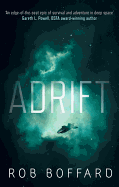
| Publisher: | Orbit | |
| Genre: | Space Exploration, Fiction, Action & Adventure, Science Fiction, Military | |
| ISBN: | 9780316519113 | |
| Pub Date: | June 2018 | |
| Price: | $15.99 |
| Science Fiction & Fantasy |
by Rob Boffard
As far as first days at a new job go, Hannah's couldn't get much worse. She's just shipped in to Sigma Station, a luxury hotel overlooking the Horsehead Nebula on the distant edge of Frontier space. The area was once a battleground between the Frontier and its breakaway Colonies, but that was years ago, and now Sigma is full of vacationers and tour guides. As one such guide, Hannah shepherds visitors onto smaller touring ships, where they can see Sigma Station and the nebula in all its glory. Hannah finds her ship, the Red Panda, at a fraction of its full capacity, with fewer than a dozen passengers of all ages, and a grizzled captain impatient with Hannah's lateness. The shuttle sets off and starts the tour, which comes to a shocking halt when Sigma Station is utterly destroyed by a mysterious warship.
Though the Red Panda survives the initial attack--one committed with terrifying, high-tech weapons--Hannah and her charges are stranded with little food and less hope. The passengers are a volatile mix of personalities and allegiances, a situation that Hannah is ill-equipped to handle. Events on board quickly grow out of her control, and somewhere nearby, the ship that murdered thousands of people on Sigma Station is still lurking. Adrift by Rob Boffard (journalist and author of the Outer Earth trilogy) is a tense, sci-fi survival story with intriguing twists and sympathetic characters. Adrift's thrilling pace and high stakes are sure to find fans across genres. --Tobias Mutter, freelance reviewer

| Publisher: | Skyhorse | |
| Genre: | Family Life, Romance, General, Contemporary, Fiction | |
| ISBN: | 9781510733688 | |
| Pub Date: | June 2018 | |
| Price: | $16.99 |
| Romance |
by Maria Duffy
Irish novelist Maria Duffy (In Search of Us) has crafted a charming, suspenseful romance in A Love Like This. William and Donna were born on the same day in the same Dublin hospital, and spend their whole lives almost meeting. Will Cooper-Smith is raised in an affluent suburb by his stern lawyer mother, while Donna O'Neill is mostly raised by her elder sister, Tina, as their mother descends into an alcoholic stupor. Will and Donna cross paths briefly in childhood; as teenagers, they nearly meet when Tina gets a job cleaning the Cooper-Smith house.
Then as adults, when something shocking shatters Will's life, he quits his mother's law firm and heads to Perth, Australia, in search of contentment. Donna, who's been happily working in a bakery, finds herself doing something surprisingly out of character after a tragedy in her own life, and sets off on a trip to Australia and New Zealand.
The tension in A Love Like This is the perfect balance to a sweet story. Duffy has created a believable series of near misses; readers will wonder if Will and Donna will finally meet. The descriptive journeys through Western Australia and New Zealand are a delightful and exotic contrast to Will's and Donna's everyday lives in Dublin. A story of overcoming odds and tragedy in search of love, A Love Like This will make even the most cynical skeptic want to believe in love at first sight, and is sure to appeal to fans of Jane Green or Cecilia Ahern. --Jessica Howard, bookseller at Bookmans, Tucson, Ariz.

| Publisher: | Blue Rider Press | |
| Genre: | Biography & Autobiography, Personal Memoirs, General, Popular Culture, Entertainment & Performing Arts, Social Science | |
| ISBN: | 9780735217874 | |
| Pub Date: | June 2018 | |
| Price: | $28 |
| Biography & Memoir |
by Violet Ramis Stiel
Violet Ramis Stiel's affectionate memoir of her father, writer-director-producer-actor Harold Ramis (Groundhog Day, Animal House, Caddyshack, Ghostbusters), offers an overview of both his successful career and their often chaotic family life. At one point, Ramis tells his daughter, "I think, really, being an adult is about acknowledging ambiguity in all areas of life and finding a way to be okay with that." Stiel embraces the disorder of her childhood and her father's life.
Stiel's parents had a "marital arrangement of low-key nonmonogamy." When Stiel was eight, her parents decided to divorce because Ramis had fallen in love with his personal assistant (and soon-to-be second wife, Erica). That same year, Ramis and his daughter visited director Amy Heckerling (Fast Times at Ridgemont High) in the hospital after she'd given birth. Later, Stiel discovered her dad had fathered Heckerling's baby girl. From an early age, Stiel visited the sets of most of her father's films, graduating to bit parts and working behind the scenes. The book ends with heartfelt memories of her father's four-year battle with debilitating vasculitis and a brain hemorrhage--something the family kept hidden. The secret kept his career safe but left the family without emotional support from loved ones.
Ghostbuster's Daughter is a genuine love letter to Harold Ramis from his adoring but clear-eyed, shrewd and opinionated daughter. Her portrait captures her father from all sides, calling him a "perfectly imperfect person" and "the best father I could have ever imagined." Fans will enjoy Stiel's deeply personal, irreverent and loving valentine to her beloved father. --Kevin Howell, independent reviewer and marketing consultant
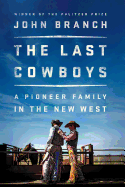
| Publisher: | W.W. Norton | |
| Genre: | Rural, Biography & Autobiography, Sociology, Regional Studies, General, Sports & Recreation, Rodeos, Social Science, Cultural, Ethnic & Regional | |
| ISBN: | 9780393292343 | |
| Pub Date: | May 2018 | |
| Price: | $26.95 |
| Social Science |
by John Branch
Pulitzer Prize-winning journalist John Branch (Boy on Ice: The Life and Death of Derek Boogaard) immerses readers in the history and deep-rooted traditions of the Wright family--who have lived in southern Utah since their Mormon ancestors arrived 150 years ago. At the heart of the narrative are contemporary patriarch and matriarch Bill and Evelyn Wright of Smith Mesa, parents of 13 children and legions of grandchildren. Love abounds as the family grows, but chronic struggles plague a way of life disappearing from the landscape of the American West.
The Wrights, herding cattle ranchers, manage and oversee hundreds of cattle over thousands of acres. Branch depicts, through riveting scenes infused with colorful detail, the many challenges posed by the politics of land management and grazing rights, urbanization and tourism, the influx of corporate cattle ranching, fluctuating beef prices and droughts. Added to the mix are adventurous stories of the modern rodeo circuit, where the Wright boys are among the world's best saddle bronc riders. The dramatic thrill of victory and the agony of defeat and injury force this hardworking, faith-filled family continually and creatively to adapt and reinvent themselves--all in an effort to maintain their way of life in the hope it can be sustained for future generations.
Branch's chronicle of a tight-knit, loyal family is meticulously researched and vividly presented. The lengths the family goes to in support of each other is thoroughly engrossing and offers a great appreciation into the plight of modern American cowboys. --Kathleen Gerard, blogger at Reading Between the Lines
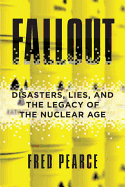
| Publisher: | Beacon Press | |
| Genre: | Energy, Radiation, Science, Health & Fitness, Safety, Environmental Science, Global Warming & Climate Change | |
| ISBN: | 9780807092491 | |
| Pub Date: | May 2018 | |
| Price: | $27.95 |
| Science |
by Fred Pearce
On a planet undergoing severe climate change because of the burning of fossil fuels, some argue that nuclear energy is a smart energy alternative. But in the insightful Fallout: Disasters, Lies, and the Legacy of the Nuclear Age, London environmental journalist Fred Pearce (The Land Grabbers) questions that logic after visiting nuclear disaster zones in Russia, Japan and the United States.
In Russia, a scientist who has helped monitor the aftermath of the 1957 Mayak reactor disaster describes for Pearce the lax safety regulations that have been a long-time staple of the power plant: "Until 1955, even pregnant women worked on plutonium products," he says. In Japan, Pearce visits the evacuated villages near Fukushima, where nuclear reactors melted down and exploded after being flooded by a tsunami in 2011. The villages have become home to several plant and animal species that are thriving in the absence of humanity. This is, Pearce argues, the happiest legacy of nuclear energy on planet Earth.
Most terrifying are Pearce's discoveries of government cover-up. He presents evidence of government officials in Japan, Russia, Britain and the United States failing to warn the public about the dangers of nuclear energy. In Russia, the government went so far as to refuse to send help to fallout victims in the name of national security. Part history lesson and part call to action, Fallout is an eye-opening and much-needed addition to the literature on nuclear power. --Amy Brady, freelance writer and editor
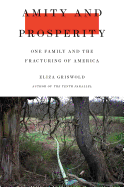
| Publisher: | Farrar, Straus & Giroux | |
| Genre: | Nature, Industries, Biography & Autobiography, Environmental Conservation & Protection, Poverty, Energy, Social Classes & Economic Disparity, Business & Economics, General, Natural Resource Extraction, Social Activists, Social Science | |
| ISBN: | 9780374103118 | |
| Pub Date: | June 2018 | |
| Price: | $27 |
| Starred | Nature & Environment |
by Eliza Griswold
In Amity and Prosperity: One Family and the Fracturing of America, poet and journalist Eliza Griswold chronicles the impact on landowners in western Pennsylvania when the hydraulic fracturing (fracking) industry comes calling with deep pockets and false reassurances. It is both an intimate portrayal of one family's protracted struggle with gas and chemical contamination and also a frank rendering of the collateral devastation often wrought by companies bent on extracting natural gas from the land.
Amity and Prosperity is centered on Stacey Haney, a nurse and landowner. Her property is contaminated by a leak at the large fracking site up the hill from her farm. Haney gets sick, along with her children and animals, and is forced to abandon her beloved farm. Therein begins her protracted six-year fight for justice and for her family's health and security. Griswold (The Tenth Parallel) reminds us that Haney and her community represent the human cost of energy development and that exploiting energy often involves exploiting people as well as the environment.
It is a testament to Griswold's gift for the written word that an account of the perils of fracking is transformed into a gripping legal drama, pitting farmers and their small tight-knit community against one another and against the powerful forces jeopardizing their land and their families' physical and mental health. Griswold boldly takes the fracking industry to task, as well as the government agencies that fail in their civic mandate to protect the environment and the rights of landowners like Haney and her neighbors. --Shahina Piyarali, writer and reviewer
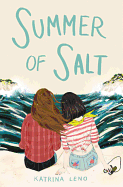
| Publisher: | HarperTeen | |
| Genre: | Death & Dying, General (see also headings under Social Themes), Fantasy, Contemporary, Family, Romance, Social Themes, Young Adult Fiction | |
| ISBN: | 9780062493620 | |
| Pub Date: | June 2018 | |
| Price: | $17.99 |
| Starred | Children's & Young Adult |
by Katrina Leno
"On the island of By-the-Sea, you could always smell two things: salt and magic." For Georgina (Georgie) Fernweh and her twin sister, Mary, odd occurrences are a part of everyday life. The Fernweh family, which has lived on By-the-Sea for hundreds of years, is magic. Every Fernweh woman inherits an ability--controlling fire, walking on water, teleportation--before her 18th birthday. While Georgie's mother is skilled with potions and Mary has been able to float since birth, Georgie is still without a gift, and, with her birthday right around the corner, she fears she may be "normal... just a sidekick." The twins are also preparing for this to be their last summer on the island, since both are setting off for college in the fall.
The twins plan to spend the summer working at their mother's inn, which caters to the devout birdwatchers who return each year to observe an unusual, maybe-300-year-old bird named Annabella on its annual island pilgrimage. But when a chilling crime shocks the island and the community is divided, the superstitious islanders (who know about but never speak of the Fernweh family magic) become suspicious of Georgie and her sister. Assisted by a few faithful friends--including Prue, a beautiful tourist with whom Georgie is quickly and secretly falling in love--Georgie races to find justice.
Treacherous weather, shaken faith, a sister who seems to lose herself more each day and insecurity in her own magical abilities all plague Georgie as she vows to protect her family, find the real perpetrators of the crime and right the wrongs in the only world she has ever known. Readers will find themselves absorbed in Katrina Leno's (Everything All at Once) Summer of Salt as they are pulled inexorably toward the painful but powerful conclusion. --Jennifer Oleinik, freelance writer and editor

| Publisher: | Harlequin Teen | |
| Genre: | School & Education, College & University, Fashion & Beauty, Social Themes, Young Adult Fiction, Self-Esteem & Self-Reliance, Eating Disorders & Body Image | |
| ISBN: | 9780373212538 | |
| Pub Date: | June 2018 | |
| Price: | $18.99 |
| Children's & Young Adult |
by Kelly deVos
Fashion blogger Cookie Vonn is the daughter of a famous supermodel--she could even be "Leslie Vonn Tate's doppelganger," except that she weighs 330 pounds. Cookie has just scored an interview with her idol, designer Gareth Miller, at her first ever fashion preview. En route through Chicago, however, flight attendants decide she needs a second seat and won't let her leave for New York unless she buys one. Mortified (and down an interview opportunity), Cookie decides she's "done being the fat girl on the plane" and joins NutriNation. Slowly, the pounds come off. When Cookie does finally meet Gareth Miller (on a plane, no less), he introduces himself with a joke about a woman who's too fat to fly! Cookie still intends to design plus-size clothes that let women "look and feel great," so when, as a PR ploy, Gareth is convinced to "launch a plus-size capsule collection" with her, Cookie seizes the opportunity.
But if Cookie thought her life would be perfect as a thin person, she has to rethink that. She's still feuding with "snothead" nemesis Kennes Butterfield; can't get anything going with her longtime crush, Tommy Weston; her parents remain mostly absent; and attending Parsons for fashion design continues to be financially out of reach. She's not even sure she likes the way people look at her now that she's thin.
Cookie is a strong character, one whom readers will enjoy accompanying on her journey of self-discovery. Engagingly told, alternating chapters go back and forth in time, allowing the author to contrast the way Cookie is treated when she's heavy and after she's lost weight. Kelly deVos, who, like Cookie, was also once "declared too fat to fly," says it best in her compelling note at the outset: "It's what's inside us that counts." --Lynn Becker, blogger and host of Book Talk, a monthly online discussion of children's books for SCBWI
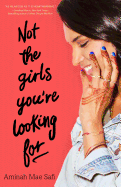
| Publisher: | Feiwel & Friends | |
| Genre: | Friendship, Religious, Social Themes, Girls & Women, Young Adult Fiction, Muslim | |
| ISBN: | 9781250151810 | |
| Pub Date: | June 2018 | |
| Price: | $17.99 |
| Children's & Young Adult |
by Aminah Mae Safi
In her compelling debut, Aminah Mae Safi depicts with poetic beauty the emotional chaos of being a teenage girl. Leila "Lulu" Saad describes herself as not "rainbows and sunshine... not some magical f*cking princess who can't form a serious opinion." With one Iraqi parent and one American parent, she goes through more turmoil than the average teen and feels like an outsider in both groups. Lulu's father's Arab family is very close: "These women [know] how to look after one another. But they never [extend] the courtesy to her mother. And they only [give] such consideration to Lulu when they [see] her father in her." At the same time, some of her white classmates view her as a terrorist after the attack on Paris: "She was Iraqi, wasn't she, they... accused. They knew she was Muslim. Her fault... the dirty little terrorist." Luckily, though, Lulu is fully accepted by her three best friends, Audrey, Emma and Lo. Lulu knows that each of the girls would go to the ends of the Earth to help any of the others--until she manages to make a horrendous mess of their friendship and winds up completely alone.
Not the Girls You're Looking For is emotionally raw and relentlessly honest and funny. Safi celebrates young women and their distinctive bonds, depicting her characters with all the foibles growing pains produce. She also presents the identity struggles of blended families with candid realism, encouraging empathy for those who find themselves straddling two vastly different cultures and are trying to figure out who they are. Though they may not be the girls you're looking for, you should definitely seek out this book. --Jen Forbus, freelancer